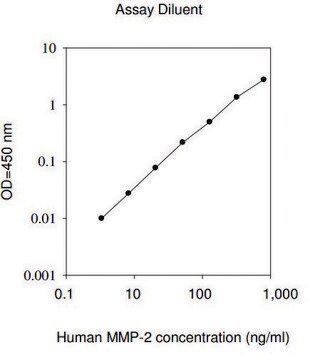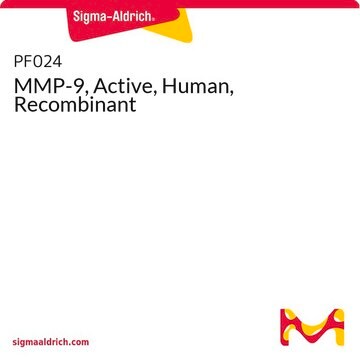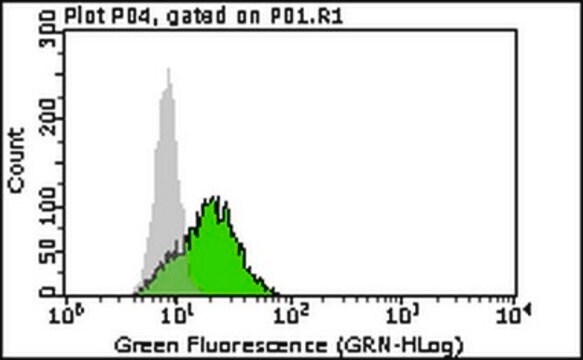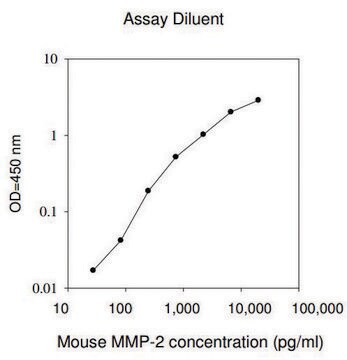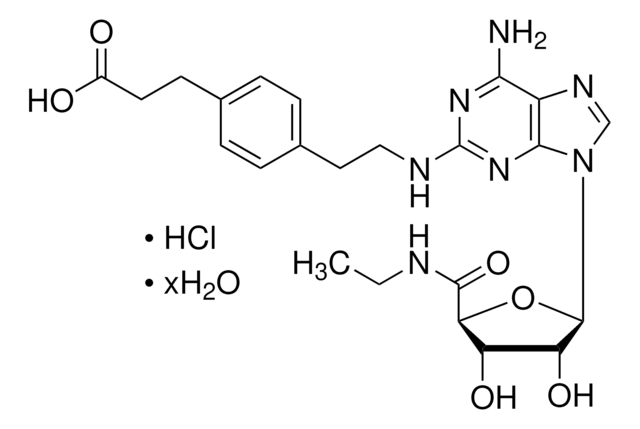おすすめの製品
由来生物
human
品質水準
形状
liquid
メーカー/製品名
Chemicon®
濃度
0.2 μg/μL
NCBIアクセッション番号
UniProtアクセッション番号
輸送温度
dry ice
遺伝子情報
human ... MMP14(4323)
詳細
BACKGROUND: Matrix metalloproteinases (MMPs) are Zn2+- and Ca2+-dependent endopeptidases which function in the turnover of extracellular matrix components [Matrisian, 1992]. Presently, eighteen secreted MMPs and five membrane-type MMPs [Sato et al., 1994; Will & Hinzmann, 1995; Takino et al., 1995; Puente et al., 1996] are known to be expressed in vertebrates. Human MT1-MMP consists of 559 amino acid residues with a calculated Mr of 63516 [Sato et al., 1994; Will & Hinzmann, 1995]. The following domains and sequence regions are distinguished in MT1-MMP: Prodomain (Ser1-Arg88), catalytic domain (Tyr89-Gly261), junction between catalytic domain and hemopexin domain (Gly262-Gly292), hemopexin-like domain (Pro293-Cys485) and C-terminal sequence (Pro486-Val559) with transmembrane segment. A soluble form of MT1-MMP without transmembrane segment has been found in culture medium of a breast carcinoma cell line [Imai et al., 1996].
MT1-MMP is expressed in adult lung, placenta, kidney, ovaries, intestine, prostate and spleen [Will & Hinzmann, 1995]. Increased amounts of the enzyme are found in tumor tissues such as lung carcinoma [Butler et al., 1998], gastric carcinoma [Nomura et al., 1995], breast, head and neck carcinoma [Okada et al., 1995].
MT1-MMP is activated by removal of its prodomain. The reaction is catalyzed by furin, a subtilysin-type serine protease, which recognizes a motif of four basic amino acid residues located between the prodomain and catalytic domain [Pei & Weiss, 1996].
MT1-MMP activates progelatinase A [Sato et al., Strongin et al., 1995; Will et al., 1996] and procollagenase-3 [Knauper et al., 1996] by proteolytic cleavage of their domains. The ability of MT1-MMP to activate other matrix metalloproteinases provides potential for enhanced pericellular proteolysis in physiological and pathological processes. In particular, activation of progelatinase A by MT1-MMP is considered to contribute to local degradation of extracellular matrix during cell migration and proliferation. MT1-MMP also hydrolyzes fibrillar collagens I, II and III into characteristic ¾ and ¼ fragments [D′Ortho et al., 1997; Ohuci et al., 1997] and it cleaves a number of other ECM proteins, including fibronectin, vitronectin, laminin-1 and dermatan sulfate proteoglycan [D′Ortho et al., 1997; Pei & Weiss, 1996; Ohuci et al., 1997]. The activity of MT1-MMP is poorly inhibited by TIMP-1 but efficiently inhibited by TIMP-2 and TIMP-3 [Will et al., 1996].
MT1-MMP is expressed in adult lung, placenta, kidney, ovaries, intestine, prostate and spleen [Will & Hinzmann, 1995]. Increased amounts of the enzyme are found in tumor tissues such as lung carcinoma [Butler et al., 1998], gastric carcinoma [Nomura et al., 1995], breast, head and neck carcinoma [Okada et al., 1995].
MT1-MMP is activated by removal of its prodomain. The reaction is catalyzed by furin, a subtilysin-type serine protease, which recognizes a motif of four basic amino acid residues located between the prodomain and catalytic domain [Pei & Weiss, 1996].
MT1-MMP activates progelatinase A [Sato et al., Strongin et al., 1995; Will et al., 1996] and procollagenase-3 [Knauper et al., 1996] by proteolytic cleavage of their domains. The ability of MT1-MMP to activate other matrix metalloproteinases provides potential for enhanced pericellular proteolysis in physiological and pathological processes. In particular, activation of progelatinase A by MT1-MMP is considered to contribute to local degradation of extracellular matrix during cell migration and proliferation. MT1-MMP also hydrolyzes fibrillar collagens I, II and III into characteristic ¾ and ¼ fragments [D′Ortho et al., 1997; Ohuci et al., 1997] and it cleaves a number of other ECM proteins, including fibronectin, vitronectin, laminin-1 and dermatan sulfate proteoglycan [D′Ortho et al., 1997; Pei & Weiss, 1996; Ohuci et al., 1997]. The activity of MT1-MMP is poorly inhibited by TIMP-1 but efficiently inhibited by TIMP-2 and TIMP-3 [Will et al., 1996].
CC1043 is a recombinant polypeptide sequence produced as a periplasmic protein in E. coli. The proenzyme consists of MT1-MMP residues corresponding to Ser1-Val501 followed by tone Thr-residue and six His-residues. The calculated Mr of the recombinant soluble proenzyme is 58200 Da.
アプリケーション
Useful as an antigen standard in immunoassays. The proenzyme can be activated with trace amounts of MT1-MMP catalytic domain (D′Ortho et al., 1997; Butler et al., 1998).
物理的形状
Provided as a liquid in 50 mM Tris-HCl, pH 7.5, 150 mM NaCl, 5 mM CaCl2.
保管および安定性
Maintain frozen at -70°C in undiluted aliquots. The enzyme may be stored at -20°C for several weeks. Repeated freezing and thawing should be avoided
アナリシスノート
Appears as a predominant band at 58 kDa in SDS-PAGE
法的情報
CHEMICON is a registered trademark of Merck KGaA, Darmstadt, Germany
免責事項
Unless otherwise stated in our catalog or other company documentation accompanying the product(s), our products are intended for research use only and are not to be used for any other purpose, which includes but is not limited to, unauthorized commercial uses, in vitro diagnostic uses, ex vivo or in vivo therapeutic uses or any type of consumption or application to humans or animals.
保管分類コード
12 - Non Combustible Liquids
WGK
WGK 1
引火点(°F)
Not applicable
引火点(℃)
Not applicable
適用法令
試験研究用途を考慮した関連法令を主に挙げております。化学物質以外については、一部の情報のみ提供しています。 製品を安全かつ合法的に使用することは、使用者の義務です。最新情報により修正される場合があります。WEBの反映には時間を要することがあるため、適宜SDSをご参照ください。
Jan Code
CC1043:
試験成績書(COA)
製品のロット番号・バッチ番号を入力して、試験成績書(COA) を検索できます。ロット番号・バッチ番号は、製品ラベルに「Lot」または「Batch」に続いて記載されています。
H Will et al.
The Journal of biological chemistry, 271(29), 17119-17123 (1996-07-19)
It has been proposed that the cell-mediated activation of progelatinase A requires binding of the C-terminal domain of the proenzyme to a membrane-associated complex of the membrane type matrix metalloproteinase MT1-MMP and TIMP-2. Subsequent sequential proteolysis of the propeptide by
H Sato et al.
Nature, 370(6484), 61-65 (1994-07-07)
Gelatinase A (type-IV collagenase; M(r) 72,000) is produced by tumour stroma cells and is believed to be crucial for their invasion and metastasis, acting by degrading extracellular matrix macro-molecules such as type IV collagen. An inactive precursor of gelatinase A
Membrane type 1 matrix metalloproteinase digests interstitial collagens and other extracellular matrix macromolecules.
Ohuchi, E, et al.
The Journal of Biological Chemistry, 272, 2446-2451 (1997)
Expression of membrane-type matrix metalloproteinase in human gastric carcinomas.
Nomura, H, et al.
Cancer Research, 55, 3263-3266 (1995)
Cardiac restricted overexpression of membrane type-1 matrix metalloproteinase causes adverse myocardial remodeling following myocardial infarction.
Spinale, FG; Mukherjee, R; Zavadzkas, JA; Koval, CN; Bouges, S; Stroud, RE; Dobrucki et al.
The Journal of Biological Chemistry null
ライフサイエンス、有機合成、材料科学、クロマトグラフィー、分析など、あらゆる分野の研究に経験のあるメンバーがおります。.
製品に関するお問い合わせはこちら(テクニカルサービス)
